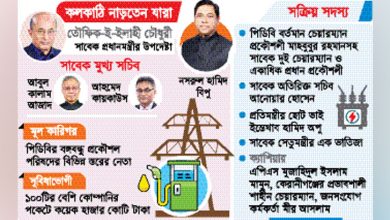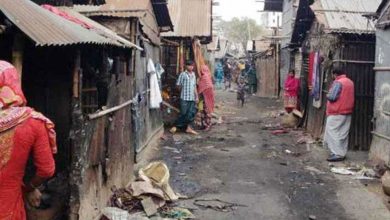US wants Bangladesh to implement 11-point labour action plan by March 2025

Govt committed to sweeping labour reforms to attract buyers: Yunus to US delegation
The United States has called for the implementation of an 11-point action plan aimed at improving labour rights in Bangladesh by March 2025.
Kelly M Fay Rodriguez, special representative for International Labor Affairs at the US Department of State, conveyed the call today (25 November) during a meeting with AHM Safiquzzaman, secretary of the Ministry of Labour and Employment, Bangladesh.
Chief Adviser Professor Muhammad Yunus told the delegation that his interim government is committed to carrying out sweeping labour reforms in an effort to attract more foreign buyers to the country.
“We want to make our labour laws at par with global standards. It is my commitment,” he said when the US labour and brand delegation met him at his office at Tejgaon, according to a press statement.
He said the interim government has appointed a special envoy only to reform the country’s labour laws and address the concerns raised by local and international labour rights groups, the International Labor Organisation and Western nations.
The delegation was led by Thea Mei Lee, the deputy undersecretary of the US Department of Labour, and Kelly Fay Rodriguez.
The two senior officials said the US, global labour rights groups, and top international brands that buy clothing and footwear from Bangladesh back Professor Yunus’s move to reform labour laws and create worker-friendly conditions in Bangladesh factories.
“All of these are wonderful testaments” to what the Professor Yunus-led interim government has done for the labour sector in the past three and a half months, Rodriguez said, referring to the steps, including the 18-point agreement signed between the government and the local unions.
The US officials called for union rights in the factories and reviews of wages every year to cushion millions of garment and footwear workers from inflationary pressures.
Yunus urged the brands to declare the price hike of their orders every January so that the manufacturers in Bangladesh can raise worker wages accordingly.
Meeting with labour ministry
Representatives of several American brands also attended the meeting. Afterwards, the labour secretary shared the details with journalists in a press briefing at the labour ministry.
The 11-point plan, issued by the US in April, outlines key reforms aimed at improving labour conditions in Bangladesh, including ensuring the right to form trade unions, enhancing workplace safety, improving working conditions, and setting a minimum wage every year. It also calls for uniform labour laws to be applied in both Export Processing Zones (EPZs) and outside EPZs.
Labour ministry Secretary AHM Safiquzzaman said, “The US delegation wants to see how the 11 points they recommended are being implemented. They want transparency in the process because US taxpayers – those who buy garments and other products made in Bangladesh – want to know how much international labour standards are being followed here.”
He added, “The Ministry of Labour has already updated the US delegation on the actions taken so far. Specifically, we informed them about the 18-point plan created with input from employers, workers and the government.
“These points include recommendations from the US, ILO, Germany and Japan. The US delegation is satisfied with Bangladesh’s efforts and is ready to cooperate on future action plans.”
The labour secretary said, “We informed the US delegation that most action plans will be implemented within the next three months, with a few exceptions. The issues that won’t be addressed immediately are supported by Bangladesh in principle, but they will take time.
“One example is implementing uniform labour laws in both EPZs and outside of them. This is because foreign investors in the EPZs made agreements based on EPZ laws. However, a third-party study will be conducted to assess the social impact of applying uniform laws.”
He added, “The government is planning to create a national minimum wage policy. Currently, wages are updated every five years. The new policy is being reviewed to see if it’s possible to update wages annually.”
Safiquzzaman also said, “The US delegation recommended making trade union registration easier and faster. They were informed that the previous rule required completing trade union registration within 60 days, but this has now been reduced to 55 days.
“Additionally, the delegation suggested that a trade union should be registered if 10% of the workers in a factory sign in favour of it. We informed them that the law currently requires 20% of workers to sign, but this has now been reduced to 15%.”
At this point, a journalist asked the labour secretary about employer interference and harassment in the trade union registration process. In response, the Secretary acknowledged the issue and explained that to resolve it, the trade union registration process will be moved online.
“Software will be purchased for this purpose, allowing applicants to apply online and receive registration within the specified time, eliminating the need for physical submissions and preventing underhanded dealings,” he added.
He also mentioned that the US delegation discussed issues such as the blacklisting of labour organisations, lawsuits, investigations, and ongoing labour unrest.
The labour ministry informed them that the government is prioritising the resolution of labour unrest and treating other issues with equal importance. They also assured that no unnecessary lawsuits would be filed.
Safiquzzaman said, “The government, business owners, and labour representatives all want to improve these situations. Once these tasks are completed, exporters in Bangladesh will be able to demand fair prices from international buyers.
“This will help raise labour wages and improve working conditions, safety, and other benefits for workers.” He added that the government is focused on gaining the trust of workers, entrepreneurs, and buyers alike.
He also noted, “The US raised concerns about human rights and elections. Human rights is a broad issue, and we have informed them that the government is working to improve the overall human rights situation.”
Safiquzzaman further acknowledged that many factories in Bangladesh face problems but stressed that these factories cannot be shut down because they employ 25,000 to 30,000 workers.
He explained that brand buyers should take over and run these factories, without any obligation for profits. The government has started paying Beximco workers’ wages through loans, but he cautioned that this cannot continue for long.







